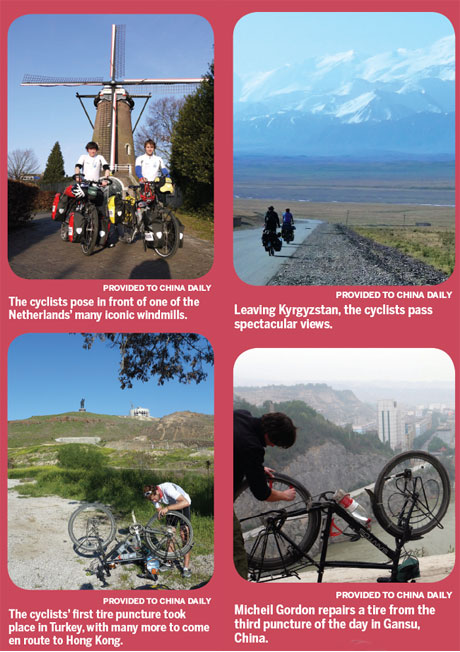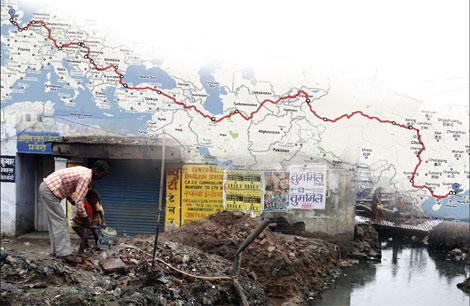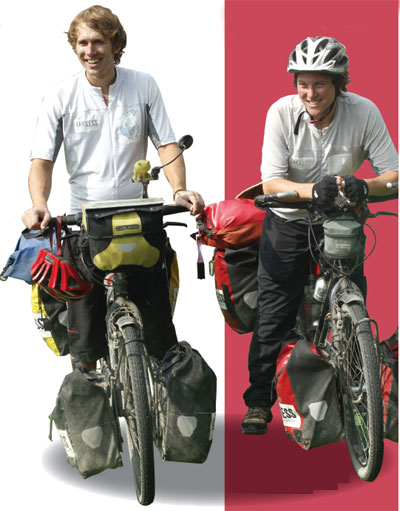Sustain the water cycle
Updated: 2011-12-14 06:54
By Doug Meigs(HK Edition)
|
|||||||
|
People collect unsafe water at a slum in Digha Maharajganj, India. Provided to China Daily |
Two cyclists rode from England to Hong Kong, raising money and awareness for more than 2 billion people who lack clean freshwater and sanitation worldwide. Their adventure challenged conventional notions of philanthropy, crossing national boundaries and local water issues. Doug Meigs reports.
The water cyclists arrived at dusk. They crossed the Shenzhen border, pedaled through green mountains of the New Territories and descended into Kowloon's congested nocturnal glow. Hong Kong city lights signaled the end of an epic journey that began in Newbury, a town in southern England.
On the morning of Nov 15, cyclists Micheil Gordon, 25 and Jon Lee, 23, re-saddled their bicycles for the symbolic final leg of their odyssey to raise money and awareness for WaterAid. The duo navigated bustling Kowloon traffic on bicycles laden with gear. A jubilant crowd of managers, publicists and employees from their corporate sponsor LANXESS (a multinational chemicals conglomerate with an office in Hong Kong) cheered the cyclists across a finish line setup inside the Kowloon Cricket Club.
After nearly nine months covering a distance of 10,000 miles, Gordon and Lee had completed their mission to Hong Kong. They had cycled across 16 countries and raised 18,520.43 (roughly HK$230,000) for WaterAid. They estimated that the funds would assist 1,500 people to obtain a lifetime of safe drinking water and sanitation.
More than 2 billion people worldwide lack clean drinking water and sanitation, according to WaterAid. The NGO works with communities and national governments to provide facilities and policy frameworks for sustainable fresh water supplies in some of the world's most disadvantaged areas. Gordon and Lee became acquainted with the role of water in human social and economic mobility during an environmental science course at the University of Brighton, where they graduated in 2009.
"If you're always confined by water, restricted by a 20-mile walk to get water for your family, or if it makes you ill, then it restricts everything you do," Gordon said. "It restricts business, it restricts education," Lee added. "Young girls sent to collect water don't get to go to school. Basically without water, there's really no chance of moving forward," Gordon continued.
The cyclists spoke with China Daily after the brief ceremony welcoming them to Hong Kong. Scraggly windswept hairstyles and suntans belied their prolonged tenure on the open road. Articulate, healthy and affluent enough to self-finance the bulk of their adventure, they are like people in Hong Kong, beneficiaries of water and sanitation standards taken for granted by residents of the developed world.
In cities as diverse as London and Hong Kong, fresh water is only a tap away, while toilets empty on command into convenient sewage systems. Attaining such access to water and sanitation is a pivotal moment in any region's development, said Daniel Yeo, senior policy analyst (Climate Change and Water Security) from WaterAid's British headquarters.
"It is only when countries have achieved access to water and sanitation that their economies have really taken off," Yeo said. "Even here in London, about 150 years ago, we had the 'great stink'. The sanitation problem was so bad - waste overflowed in the Thames and the stench reached to Parliament (temporarily closing the House of Commons). Then the city revolutionized its sanitation and sewage system, and that was the tipping point for all the growth that has happened since, in London."
Water issues also plagued Hong Kong throughout its modernization. Water rationing was a constant reality of the 1950s as the urban population swelled. Residents made daily trips to obtain water for bathing, cooking and cleaning. The colonial government responded by constructing rainwater reservoirs, implementing saltwater toilet flushing, and importing water from the mainland. Hong Kong did not achieve consistent supply of ample freshwater until the 1980s. Ever since the 1990s, Guangdong's Dongjiang (East River) has satisfied 70-80 percent of Hong Kong's fresh water demand.
Gordon and Lee planned their expedition for nearly a year in advance. Lee had previously cycled across the United Sates, from Seattle to New York City in 2008, and they both wanted to take on a post-graduation adventure for charity. Lee had contacted WaterAid and was considering riding to South Africa, but rerouted the itinerary to Hong Kong. WaterAid offered its support, though the cost of the trip and planning remained the cyclists' responsibility (out-of-pocket expenses figured at roughly HK$55,000). Before beginning, they approached LANXESS, which agreed to fund their bikes, gear and made a 10,000 donation.
"The first month was very tough for me," said Gordon, who had never cycled for more than one full day previously. "My knees were clicking, muscles contracting, and when we got to the end of the day, all I could do was pass-out on the pillow. But now, we can cycle 100-120 km and then go out for drinks. By the time we got to Turkey we realized that we could cycle everyday without a problem."
The thrill of adventure and sense of social contribution pushed the cyclists. The dire straits of millions upon millions around the world lent urgency to their struggle over countless mountain passes. According to WaterAid, inadequate access to water and sanitation is the biggest killer of children in Africa and the second biggest killer of children in South Asia.
They fundraised in Britain before departing. On one occasion they dressed as giant toilets. While traveling through Europe, they sold water bottles in shopping centers, public areas and corporate offices to raise money. Every dollar makes a difference, said Yeo, claiming that every $1 invested in water and sanitation yields an eightfold return to the economy. The result may be counted lives saved, days of school or work lost, and greater gender equality.
Fundraising became nearly impossible as they entered less affluent regions of Central Europe. Transients began begging for food and money. Fundraising entered a hiatus, though occasionally fellow travelers volunteered donations after hearing their story.
WaterAid works in 27 countries throughout Africa, Asia and Central America, focusing efforts where Yeo said "the need is highest". Although the NGO is not actively involved in regions along the route Gordon and Lee traveled, Yeo said access to water continues to cause social and political conflict all along their path.
En route to observing local water issues, they also experienced new cultures. They passed Dutch windmills, crossed the Alps and cruised through Eastern Europe. Upon entering Turkey, strangers began offering cups of tea. In Iran, the cyclists choked on clouds of black car exhaust, while men offered fresh fruits and a friendly greeting on the roadside. Both Gordon and Lee suffered bouts of food poisoning during the journey, and bike repairs were a regular occurrence. By the time they reached Hong Kong, they had accumulated 25 tire punctures, three new tires and one replacement spoke.
In Turkmenistan, they stopped to ask directions to a public toilet. "A man points to the river," Lee said. "The same river where one guy is already going to the toilet, another guy is washing his food, and still another guy is having a drink out of, with a dead dog floating past."
They tried to drink bottled water when it was available. Sometimes they had little choice. Gordon once suffered severe sunstroke and nearly lost consciousness. Lee stopped the passing traffic seeking water. "They would hand us an old bottle filled with river water. That is what they drank," he said.
In Uzbekistan, while riding through an arid desert, they encountered cotton fields irrigated by the rivers feeding the Aral Sea. "It would be green trees and cotton. Then you would cross a line, and it would literally be all dust, sand, dessert dry nothing," said Gordon. He was aware that the lush landscape resulted from the Aral Sea disaster a few hundred kilometers to the south, a textbook environmental catastrophe caused in the 1960s when the former Soviet Union diverted water to new farms in arid lands. Once one of the world's largest inland seas, the Aral Sea is now one tenth its former size, with ecosystems and fishing economies devastated.
Each of the cyclists carried nearly 18 liters of water on his bike, enough water for two days. In the remote deserts of Xinjiang and Qinghai, they rationed supplies. "Some of the places that we went through were just so dry that we wouldn't sweat," Gordon said. "There would not be a drop of water on us. And we're drinking 9 liters of water a day and not going to the toilet. That's a very strange feeling. The water just disappeared."
Heading south through China, they witnessed some of the starkest contrasts of their journey. They passed majestic landscapes, and upon crossing into a new valley, discovered industrial factories pumping chemical froth into streams crisscrossing otherwise idyllic scenes. The pollution grew notably worse as they continued south to the Pearl River Delta.
According to the latest figures from the World Health Organization, Yeo said China is home to 148 million people who are without access to fresh water, while 100 million residents lack access to sanitation. WaterAid currently does not have plans to work in the country, however. "In terms of percentages the need is not necessarily that high in China, but in terms of absolute figures, it is huge. One of the criteria we have for countries we work in is where the government's capacity is weak or lacking, whereas in China, there's a bit more capacity."
Gordon and Lee's adventures are recorded on their website (http://hongkongcycle.co.uk), and they have a fundraising page at justgiving.com.
Gordon and Lee hope their trip encourages others to try a cycling expedition. Their website includes a gear list and tips for anyone interested. Since flying home to the UK, they've spent the past weeks concluding their fundraising efforts with additional school talks around the country. Their funding tally continues to rise (at last count the figure was 20,266.43, roughly HK$248,000).
After a year on the road, the water-cyclists are now embarking on a new endeavor: Finding work. Inspired by the talks they've been giving, Lee plans to teach English in Austria. Gordon on the other hand is headed back to the mainland, to assist a former tutor with research on waste management in Shanghai.

|
Jon Lee (left) and Micheil Gordon (right). Doug Meigs / China Daily |
(HK Edition 12/14/2011 page4)

